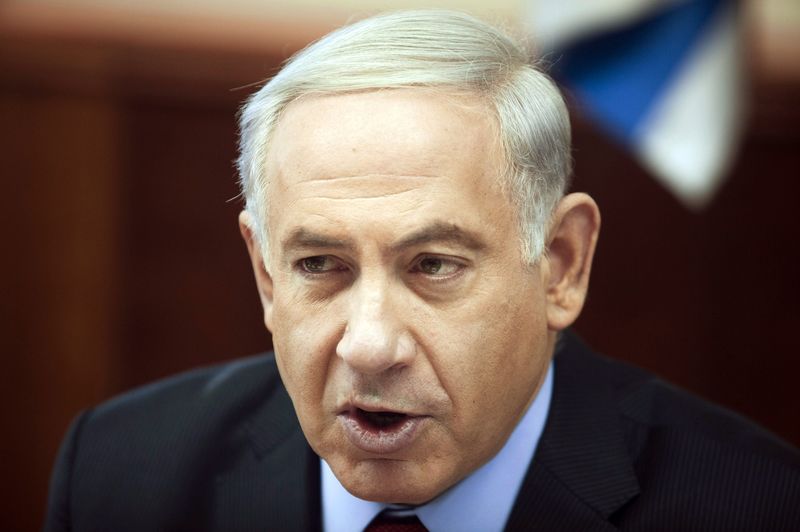(Bloomberg) -- Israeli Prime Minister Benjamin Netanyahu’s political future could depend on the fate of several small parties that are barely clinging to their parliamentary seats, as two exit polls showed his right-wing Likud-led bloc with a slight edge over a former military chief’s alliance.
Netanyahu’s Likud and retired general Benny Gantz’s Blue & White each won about three dozen of parliament’s 120 seats. But together with other right-wing and religious partners, the Netanyahu-led grouping secured a total of 66 seats in one exit poll, and 64 according to another. A third poll showed the blocs tied. Both sides claimed victory ahead of the release of preliminary results.
Complicating the outcome is the relatively large number of parties that are in parliament but won’t necessarily win enough votes to make it into the next legislature. That’s made it difficult to predict how potential coalition governments could shape up.
“There’s no way to know because of the smaller parties,” said independent pollster Mitchell Barak. “All the people who said they weren’t going to sit with Gantz -- that’s all off.”
A Likud party spokesman said Netanyahu has already launched coalition talks with heads of other parties, without identifying them.
About 6.3 million people were eligible to vote for the 120-member parliament, or Knesset. Final results will be announced Thursday, and a week later President Reuven Rivlin will assign a party to build the next coalition. That task won’t necessarily go to the party with the most seats, but to the one deemed best able to form an alliance of at least 61 Knesset members. If Netanyahu prevails, he’s poised to become Israel’s longest-serving leader in July, surpassing founding father David Ben-Gurion.
Gantz’s supporters said it was time for the legally embattled prime minister, popularly known as Bibi, to go.
“I want Bibi not to be in power,” said Danielle Makbert, 23, at a Tel Aviv voting station.
Fight of His Life
The election was the political fight of Netanyahu’s life, with voters asked to endorse his muscular brand of nationalism or toss him out of office to battle corruption allegations that have tainted his latest term. With pre-election polls showing a tight race, Netanyahu had waged a bruising campaign, painting the centrist candidate as a weak leftist while wooing right-wing voters with a promise to annex parts of the Israeli-occupied West Bank.
Gantz has the security credentials prized by Israelis and a clean-hands image, but lacks the political experience the prime minister has accrued in a combined 13 years in office. In large part, the campaign was a referendum on Netanyahu’s character, as he’s likely to be indicted on corruption charges later this year.
The campaign has been overshadowed by Attorney General Avihai Mandelblit’s intention to charge the 69-year-old Netanyahu in three graft cases, pending a post-election hearing. Netanyahu says he’s an innocent victim of a political witch hunt and will only stand down if convicted.
Sweeping Implications
The election result could ripple across a volatile region. Peacemaking with the Palestinians has stalled under Netanyahu’s watch; instead he opted to improve Israel’s ties with Gulf Arab states by leveraging a shared distrust of Iran. Gantz, a 38-year military veteran, has talked vaguely about “separation” from the Palestinians and hasn’t uttered the term “statehood,” yet he’s signaled he’d make more effort to restart peace talks.
A U.S. peace plan, which the Trump administration says will present new solutions to break the impasse, is expected to be unveiled shortly after the election.
Just ahead of polling, Netanyahu pitched for right-wing voters who might be tempted to back other nationalist factions, suggesting he could annex Jewish settlements in the West Bank, which Palestinians want as the heartland of a future state.
Fending Off Pressure
For his supporters, Netanyahu has offered strong leadership in a combustible region. He enjoys warm relations with President Donald Trump, who’s delivered him jackpots like withdrawing from the Iran nuclear deal, recognizing Jerusalem as Israel’s capital and recognizing Israeli sovereignty over the Golan Heights.
Israel’s economy grew nearly 75 percent during Netanyahu’s decade in power, expanding even during the global recession, though the gains haven’t done much to close the gap between rich and poor.
But it’s on issues of war and peace where Israeli leaders make their reputations, and here, Netanyahu’s combative policies have delighted right-wing backers.
Netanyahu’s government recently adopted a law that defined Israel as the Jewish homeland while contentiously omitting mention of equality for Arab citizens, who comprise a fifth of the population and whose rights are enshrined in other legislation. He’s established warm ties with like-minded nationalists in Poland, Hungary and Brazil who’ve emerged as strong defenders of Israel.
If he wins, allies could try to enact legislation protecting Netanyahu from prosecution as a sitting leader. Either way, another term could bring as much instability as continuity, with the prime minister preoccupied with battling to clear his name and fending off pressure to resign.
